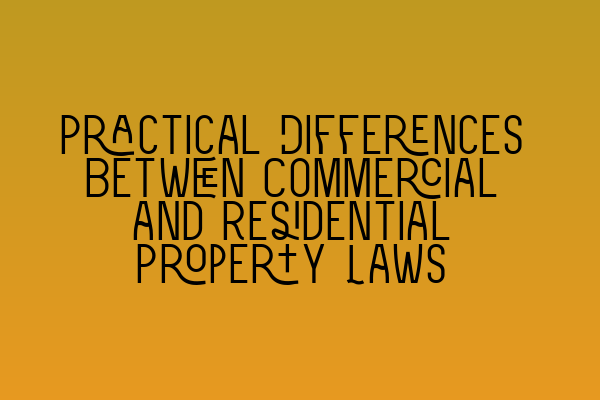Practical Differences Between Commercial and Residential Property Laws
When it comes to property law, there are significant differences between commercial and residential properties. Whether you are a property owner, developer, investor, or tenant, understanding these differences is crucial to ensuring you navigate the legal landscape smoothly and make informed decisions. In this blog post, we will explore the practical distinctions between commercial and residential property laws and shed light on how they can impact various aspects of property transactions.
1. Scope of Application
Commercial property laws primarily focus on properties used for business purposes. These include offices, retail spaces, warehouses, and industrial premises. On the other hand, residential property laws govern properties used for residential purposes, such as houses, apartments, and condominiums. Each category has its own specific set of laws and regulations that dictate how the property can be used, leased, or sold.
2. Leases and Tenancy
Commercial leases tend to be more complex and involve extensive negotiations. They typically have longer durations, ranging from several years to even decades, and contain detailed provisions related to rent increases, maintenance responsibilities, and the use of the property. It is common for commercial leases to involve additional considerations, such as rent reviews, break clauses, and assignment or subletting provisions.
Residential leases, on the other hand, are often governed by statutory regulations that grant certain rights and protections to tenants. Residential leases are typically shorter in duration, often lasting for a year or less, and are subject to more standardized terms. Landlords of residential properties must comply with specific laws regarding security deposits, eviction procedures, and fair housing practices.
3. Planning and Zoning
Planning and zoning regulations play a crucial role in property development. Commercial properties are subject to more stringent planning and zoning requirements due to their potential impact on the local economy, environment, and community. Developers must obtain appropriate permissions and approvals before proceeding with a commercial project.
Residential properties also face planning and zoning restrictions, but these tend to be more focused on issues such as land use, density, and the provision of amenities. Local authorities often have specific guidelines and regulations in place to ensure the development of safe and suitable homes for residents.
4. Financing and Mortgages
Commercial property financing differs significantly from residential property financing. Lenders assess commercial properties based on their income potential, market trends, and the financial viability of the business occupying the property. Consequently, commercial mortgages typically come with higher interest rates, stricter eligibility criteria, and larger down payment requirements.
Residential mortgages, on the other hand, assess the borrower’s personal creditworthiness and financial stability. These mortgages tend to have lower interest rates, longer repayment terms, and more flexible qualification requirements. The primary consideration for residential mortgages is the borrower’s ability to make regular mortgage payments.
5. Dispute Resolution
Disputes relating to commercial and residential properties are resolved through separate legal procedures. Commercial property disputes often involve complex contractual issues, business considerations, and commercial tenants’ rights. Methods such as negotiation, mediation, or arbitration may be employed to achieve resolution, with litigation being the last resort.
Residential property disputes typically revolve around issues such as rent arrears, maintenance disputes, or breaches of tenancy agreements. They are often resolved through the established landlord-tenant dispute resolution mechanisms, such as court actions or tribunal hearings.
Conclusion
Understanding the practical differences between commercial and residential property laws is crucial for anyone involved in the property market. Whether you are an owner, investor, or tenant, being well-versed in these distinctions will enable you to navigate legal complexities more effectively, make informed decisions, and protect your interests.
If you are interested in furthering your knowledge in property law or preparing for the SQE exams, we recommend checking out our related articles and resources:
– SQE 1 Practice Exam Questions
– SQE 1 Practice Mocks FLK1 FLK2
– SQE 2 Preparation Courses
– SQE 1 Preparation Courses
– SRA SQE Exam Dates
At SQE Property Law & Land Law, we offer comprehensive legal services and expert advice to help individuals and businesses navigate property law matters successfully. Contact us today to learn more or discuss your specific needs.
